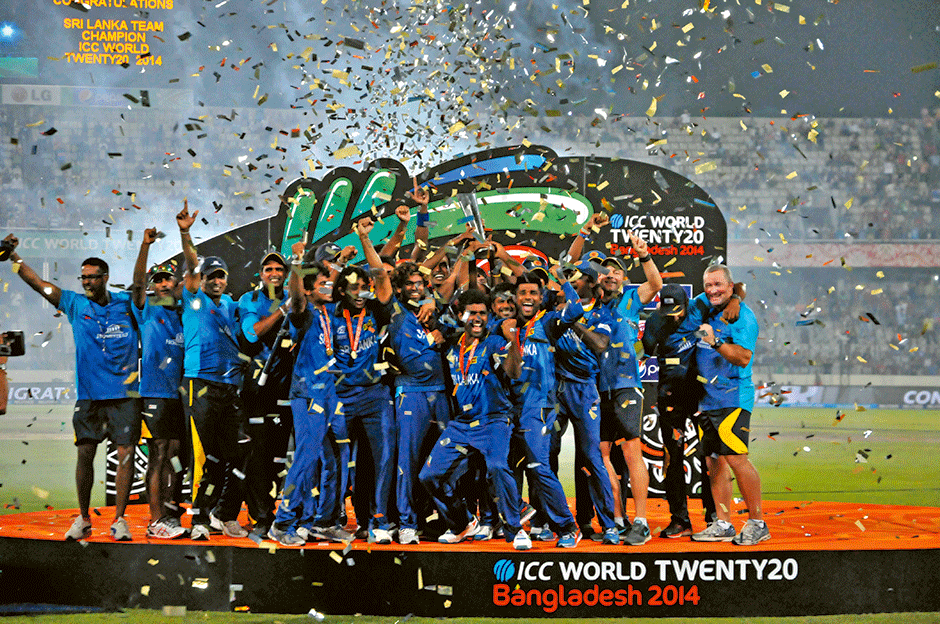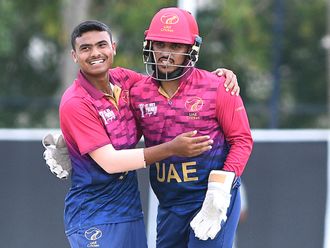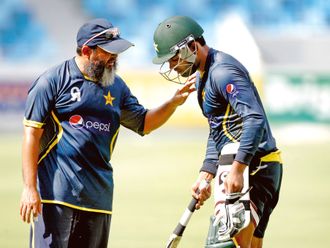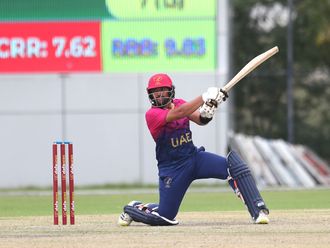The Twenty20 (T20) World Cup is one of those rare tournaments where there is no distinct favourite going into the competition.
The nature of the format is such that any team on a given day can come out triumphant and cause an upset. That there have been five different winners in the five editions of the tournament played so far is indicative of this unpredictability, making the competition all the more entertaining and intriguing.
Unlike in the 50-over World Cup, where it has been all about Australia except in 2011 when India won the title at home, the World T20 has been far more open and capricious. The reason, it can be conjectured, is deep-rooted in the format itself, which is much more dependent on individual brilliance and one good burst than either 50-over cricket or the more conventional Test match variety.
Well begun is...
In T20 cricket, there is hardly any time to recover. A bad start, which might mean the loss of a few key wickets or giving away 50 or more runs in the first three to four overs, can spell doom for any team. However good the team may be, the rapidness of the format means it is impossible to make up lost ground. This is why relative minnows have far more potency in the World T20. In Test or even the ODIs, bigger teams have the chance to stage a comeback. They have players with the temperament to lift themselves out of a slump and reassert themselves in the game.
For example, if Australia are three down for 30, they will still have the depth to recover and post a 250-plus total in a 50-over game. And with a bowling unit that is capable of handling pressure, nine times out of ten you’d expect an Australian side to defend a par score against a minnow.
Not so in T20. Three down for 30 means the top order has failed to make use of the batting powerplay and the field restrictions in the first six overs. It also means the middle order will inevitably take a couple of overs to settle down and get a partnership going. In doing so, valuable time and balls are often lost and the advantage thus conceded enables the opposition to press home the lead.
If the game is between two evenly matched sides, this early advantage turns far more significant. A good team will inevitably push through the benefit and grind out the opposition. In an Australia versus India contest, it is highly unlikely that an Indian side could make a comeback after losing Rohit Sharma, Virat Kohli, Shikhar Dhawan and Suresh Raina in the first five overs. For Australia too, the early loss of David Warner, Aaron Finch and Steve Smith would virtually hand India the match.
One big contribution
The other factor that adds to the unpredictability is the importance of individual brilliance. The reason pedigreed sides like Australia, Sri Lanka and Pakistan have an advantage over teams like Afghanistan or Zimbabwe in Test or ODI is that they have far more depth in both batting and bowling. None of the bigger teams depend on one particular individual. Australia, for example, have Warner, Finch, Smith and Shane Watson, each capable of swinging a match on its head. Bangladesh on the other hand are heavily dependent on Tamim Iqbal at the top and Shakib Al Hasan in the middle order.
In T20 a whirlwind start from Iqbal can very well set up the game for Bangladesh and the relative inability of the other batters will hardly get exposed if the first ten overs have already been accounted for. Again, a terrific spell from Mustafizur Rahman where he picks up three or four wickets in his four overs would leave the opposition little opportunity for a comeback.
The 2012 World T20 in Sri Lanka is a good case in point. Playing the final on home soil, Sri Lanka were the favourite to start with. West Indies, with the presence of a number of T20 specialists in Chris Gayle, Marlon Samuels and Kieron Pollard, didn’t surprise by making the final. But in Lasith Malinga Sri Lanka had the best T20 bowler in the world and he had had an outstanding tournament. In the final, however, it was an entirely different story. Samuels, the silent assassin, tore into Malinga and the slinger was hurled to all corners of the park.
The incredible innings made up for Gayle’s failure and was good enough to nullify the Malinga threat and win West Indies the crown. Struggling at 44 for 2 after 11 overs, West Indies managed to score close to a hundred runs in the last 9 overs to reach a competitive 137. That one innings, from Samuels, against all odds, had made the West Indies World T20 champions.
What is significant about this contest is that until the halfway stage there was no way one could guess West Indies will eventually win. Sri Lanka had started well and was in control of the game before the mayhem began. It was actually a 20-minute blitzkrieg from Samuels that killed the match. Here was one man’s individual brilliance for a very brief period of time that ensured the depth in the Sri Lankan team was of no use and West Indies, after a eight-year gap, had managed to win a major tournament.
It is this unpredictability more than anything else that forces me to stop short of calling India the favourites despite the tournament being at home for Mahendra Singh Dhoni’s team. Any one team among Australia, Pakistan and New Zealand can upset India given the amazing number of power hitters each of them have. To go back to CLR James, “What do they know of [T20] cricket who only cricket know?”
Top contenders
India
They are one of the biggest underachievers in the World T20 after winning the inaugural competition in South Africa in 2007. Despite playing in the IPL for eight straight seasons, the Indians have failed to win the World T20 a second time, losing out in the finals in 2014. The single biggest problem continues to be death bowling with experienced campaigners like Umesh Yadav unable to do what is expected of him. In batting, inconsistency is the issue and the two middle-order stalwarts, Yuvraj Singh and Suresh Raina, haven’t been in the best form of late. There is an overdependence on Rohit Sharma, Virat Kohli and M.S. Dhoni and that might be a problem in the closing stages of the tournament. Much will depend on the spinners, Ravichandran Ashwin and Ravindra Jadeja on home soil.
Australia
They have suffered a serious blow with Mitchell Starc out with a toe injury. Easily the best bowler in the world at the moment, Starc’s absence will mean Australia will be a bowler short at the death. However, they have a potent team with David Warner and Aaron Finch at the top of the order, followed by captain Steve Smith, Glen Maxwell and Shane Watson. While Warner is in the form of his life, Watson was the best player of the 2012 World T20 and is still one of the best all-round players. In Maxwell they have a surprise package and Finch is one of the most underrated match-winners. Having never won the World T20, motivation is high. The spin bowling, however, continues to be a concern and will influence how far Australia will go in the tournament.
— The sports writer is the co-author of Sachin Tendulkar’s biography Playing it my Way











